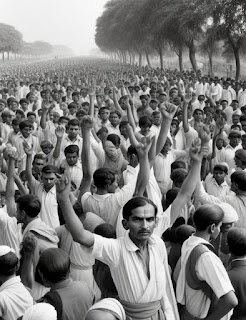The Quit India Movement : India's Defiant Struggle for Freedom
The Escape from India Movement, also known as the August Movement, was an important stage in India's struggle for independence from British colonial rule. Launched on 9 August 1942, the movement marked a turning point in India's struggle, demonstrating the unwavering determination of the people to achieve self-government.
Background:
In the early 1940s, India spent decades under British imperial rule, marked by economic exploitation, political repression and social inequality.
Calls for independence gained momentum, with leaders such as Mahatma Gandhi, Jawaharlal Nehru and Sardar Patel demanding an end to British rule.
In the wake of World War II, the Quit India movement emerged as a way to capitalize on the global situation and promote freedom.
Gandhi's call to leave India:
Mahatma Gandhi's eloquent call to "Do or die" echoed across the country on August 8, 1942, when he called on Indians to rebel nonviolently against British rule. He urged the British to leave India, saying the people would not cooperate with any form of governance until they were released. Gandhi's call to unite Indians from all walks of life, overcoming linguistic, religious and socioeconomic divisions.
Repression and Punishment:
In response to the Quit India movement, the British colonial government resorted to harsh repressive measures. Mass arrests of political leaders and activists followed, aimed at suppressing the uprising. Communication networks were disrupted and a curfew was imposed to crack down on dissidents. Despite these efforts, the movement continued to grow, as ordinary citizens took the lead and organized protests.
Civil Disobedience and Unrest:
The Quit India movement has seen widespread acts of civil disobedience, strikes and protests. Government buildings were targeted and railroads, telegraph lines and other infrastructure were disrupted. The challenge embodies the indomitable spirit of the Indians seeking self-reliance. However, the movement is not without challenges - divisions have emerged in the Indian Parliament over the methods and strategies used.
International context:
The background of the Second World War played an important role in the formation of the Quit India movement. The decision by the British colonial government to involve India in the war without consulting Indian leaders caused widespread anger. The movement gained international attention and sympathy, influenced British public opinion and pressured the British government to reevaluate its stance towards India.
Legacy and impact:
Although the Quit India movement faced fierce repression and did not lead to immediate independence, it left an indelible mark on India's struggle for freedom. The movement demonstrates the resilience and solidarity of the Indian people against the colonial regime. The international attention it attracted put pressure on the British government to accelerate its journey towards self-governing India.
Ultimately, the Quit India movement sowed the seeds of independence and laid the groundwork for future constitutional negotiations and developments.
The struggles and sacrifices of the people in this movement highlighted the inevitability of India's eventual liberation. The legacy of the movement continues to inspire generations, as a reminder of the power of collective action and the pursuit of justice and freedom.
#Indianhistory #upsc



Comments
Post a Comment